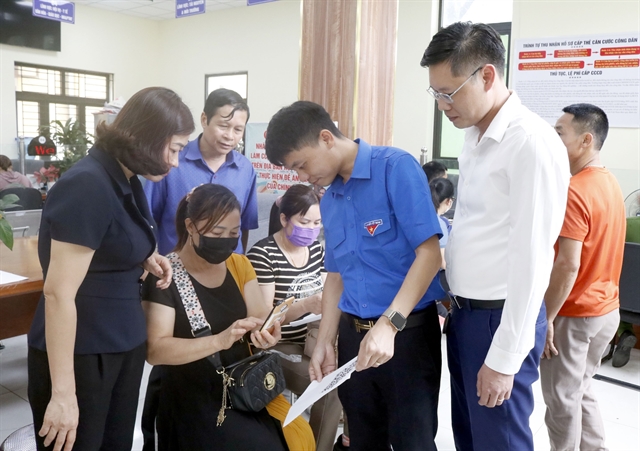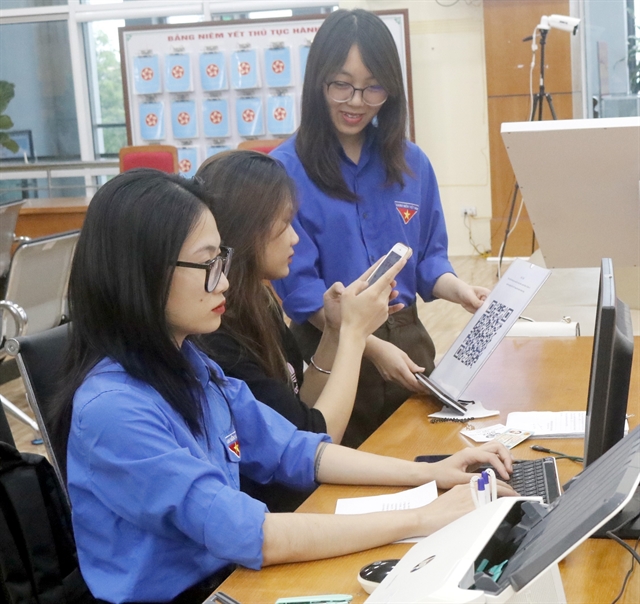 Society
Society


|
| Inauguration ceremony of the electronic information portal of the Provincial Party Committee of Bắc Giang Province. |
BẮC GIANG — Bắc Giang Province plans to establish and develop an electronic and digital government, with the goal of providing 100 per cent of public services online at level 4 by 2025.
Level 4 represents the highest standard of online public services, enabling users to complete and submit forms, as well as make online payments.
Mai Sơn, Vice Chairman of the provincial People's Committee, stated that the province is developing an electronic and digital government with an operational model designed and based on data and digital technology. This approach aims to transition the activities of party committees and authorities into a digital environment, ensuring information security.
The province is actively fostering a digital economy and society to transform the governance and business models of enterprises, as well as the lifestyles and work methods of the population, generating new values for society.
Sơn said the province targets that over 95 per cent of provincial-level administrative tasks, 85 per cent of district-level tasks, and 65 per cent of commune-level tasks will be processed online.
A 100 per cent interconnected and shared database will serve as the foundation for the development of the province's electronic and digital government. The broadband fibre optic network infrastructure will cover 100 per cent of administrative units at the commune level and households.
Bắc Giang also aims for 100 per cent of the population and businesses to use identified and authenticated online public services across all government levels by 2030. All State agencies in the province will participate in opening and providing open data to support the development of the digital government, digital economy and digital society.
Notably, Bắc Giang is developing the model of smart cities in Bắc Giang City and Việt Yên District. This is also part of the province's long-term vision, he said.

|
| Youth Union members guide citizens to scan QR codes to obtain survey ballots at the provincial public administrative centre in Bắc Giang Province. |
To achieve this goal, Sơn said, Bắc Giang is working to build a modern digital conversion data centre, meeting at least Tier 3 standards, utilising cloud computing technology and converged super-architecture.
The province is developing a specialised high-quality data transmission network infrastructure to ensure connectivity across the three administrative levels.
It is also developing digital platforms, including upgrading and enhancing the provincial integrated data sharing platform, building a platform for connecting digital services using artificial intelligence technology.
The province is keen on developing applications, databases and digital services such as establishing the Bắc Giang Digital Data Warehouse, enhancing the deployment of online public services, and efficiently adopting core digital transformation technologies.
Bắc Giang is developing urban spatial data infrastructure, consolidating data on land, construction, urban planning, transportation, and other data through the geographic information system, he said.
Applications and services for citizens and businesses are prioritised, including the Bắc Giang Provincial Open Data Portal, the provincial administrative procedure information system, and solutions to connect with telecommunication businesses to implement small-value transactions through mobile money accounts.
Up to now, Bắc Giang has achieved significant results in the building and development of electronic and digital government. In the first phase of the digital data warehouse, integration and storage of databases from provincial specialised databases have been carried out. Data processing and cleaning have resulted in the formation of seven shared databases suitable for the e-government model.
According to Sơn, the province has continued to maintain and develop shared information systems and specialised software for operational and sectoral management.
The province’s administrative procedure resolution information system has been developed based on the integration of the one-door electronic information system and the public service portal.

|
| Citizens are surveyed about their satisfaction with public servants at the People's Committees at all levels in Bắc Giang Province. |
The provincial People's Committee will continue to implement 25 essential public services integrated into the national public service portal to serve the transactional needs of citizens and businesses.
Tạ Thu Thanh, residing in Dĩnh Kế Ward in Bắc Giang City, said the integrated one-door service has become more modern, she could check results and look up information online.
Nguyễn Tiến Tú, Deputy Head of the Office of the provincial People's Council said citizens will be guided to register accounts, submit documents, and handle administrative procedures on the Public Service Portal at the one-door service in wards and communes.
Additionally, the city will instruct departments and sectors to focus on digitising records and administrative procedure results to develop and reuse data in the implementation of administrative procedures, and provide online public services, he added. — VNS